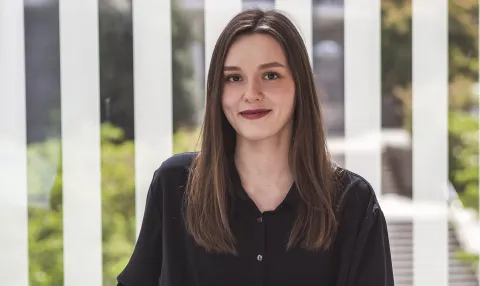“Architecture is about empathy and in order to be empathetic in the way you design, you have to go out and test your own responses to different spatial qualities so that you can start to imagine what effects your decisions would have on other people.”

Veronica Troughton
- Degree:
- Bachelor of Design in Architecture, Landscape Architecture, and Urbanism
- Grad year: 2019
- Program:
- Campus: Vancouver
I recently graduated from UBC with an honours degree in environmental design. As a creatively-oriented person, I’ve always been interested in the fine arts and the process of expression through making; however I often struggled to find meaning in those activities alone. My studies at UBC have given me the opportunity to use the creative thinking and technical skills I’ve gained with an arts background to address some of the complex social and ecological issues that my generation of designers will face. My passion for understanding and exploring the crucial relationship between people and the environments we interact with every day is what motivates me to evolve as a designer.
What has made your time at UBC the most memorable?
The studio culture of the environmental design program was something I will never forget. Being able to work alongside likeminded people and be inspired by those around me was one of the most enjoyable aspects of the program.
What have you learned in environmental design that is most valuable?
Collaboration is so important. As a highly introverted person, it’s natural for me to want to keep to myself and work individually. However, I quickly learned that the best design thinking doesn’t happen in a vacuum and the most valuable insights I’ve gained have come from conversations with classmates, professors, and other mentors. Not only has a willingness to collaborate contributed to my success in the program, but also given me the skills to become a more thoughtful and focused leader.
How do you feel a degree in environmental design has benefitted you compared to a different field of study?
Ultimately this degree has given me the ability to think like a designer, which is not just specific to architecture, but applicable to many other pursuits. The skills I’ve gained in solving open-ended problems, working effectively in teams, and communicating my ideas visually and concisely have prepared me for a wide range of possible career paths.
Where do you find your inspiration?
I find inspiration through observation, so for me, travelling and physically experiencing well-designed spaces can be very creatively stimulating. Architecture is about empathy and in order to be empathetic in the way you design, you have to go out and test your own responses to different spatial qualities so that you can start to imagine what effects your decisions would have on other people.
What are your plans for the future?
I plan on working in the architecture industry for the next few years to gain more real-world design experience. I also want to get a better idea of how the design processes I’ve learned in the environmental design program translate to professional practices at a variety of scales and project types. I want to go forward with the understanding that education is an ongoing process and any work experience I gain now will be an asset for when I eventually pursue a master’s degree in architecture.


